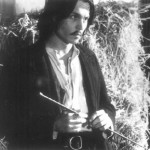A traditional ballad about gypsies and the charm of the “exotic”: a Lady abandons her husband to follow a gypsy, and although pursued and recalled to her responsibilities by her husband, she refuses to go home
From Scotland the ballad spread to England, Ireland and America in a great variety of lyrics and melodies.
Una ballata tradizionale sugli zingari e il fascino dell’”esotico”: una bella lady abbandona il marito per seguire un fascinoso zingaro, e sebbene inseguita e richiamata alle sue responsabilità dal marito, si rifiuta di tornare a casa.
Dalla Scozia la ballata si diffuse in Inghilterra, Irlanda e America in una grande varietà di testi e melodie. Story background
Story background
SCOTTISH VERSIONS
RAGGLE TAGGLE GISPY (standard version)
THE ROVIN PLOUGHBOY (Bothy Ballads version)
JOHNNY FAA – THREE GYPSIES – Child #200 A
GYSPY LADDIE – SEVEN YELLOW GYPSIES – Child #200 B
SEVEN GYPSIES english versions
The Whistling Gypsy irish version
Gypsy Davey (irish version)
AMERICAN VERSIONS:
Black Jack Davey
Gypsy Davvy (Peter Seeger, Woody Guthrie)
Gypsy Davvy (Doc Watson, Sandy Danny)
Roving Gypsy (Celtic Canada)
This variant of the ballad about gypsies who kidnap a Lady, was collected in 1951 by MacEdward Leach from the testimony of Mrs. T. Ghaney of Fermeuse (Newfoundland), and published in MacEdward Leach And The Songs Of Atlantic Canada.
In truth, the lady seems to spontaneously follow her wandering gypsy, well-intentioned to live the adventure rather than take care of the house, children and husband!
Questa variante della ballata sugli zingari che rapiscono una Lady è stata raccolta nel 1951 da MacEdward Leach dalla testimonianza della signora T. Ghaney di Fermeuse (Terranova), e pubblicata in MacEdward Leach And The Songs Of Atlantic Canada.
Per la verità la signora sembra seguire spontaneamente il suo zingaro vagabondo, ben intenzionata a vivere l’avventura piuttosto che occuparsi di casa, figlioli e marito!
I Standing by her window one day, Gazing out at those Gypsies gay, When a silly thought ran in her mind, To follow those rovin’ Gypsies true. II Her husband came home late that night, Inquiring for his lady gay; I’m afraid, I’m afraid, said the gay kitchen maid, She has followed those rovin’ Gypsies true. III Come saddle my horses, get ready my cane, Come saddle my horses, and l will go see; With a brace of pistols hang’d to his side, As he followed those rovin’ Gypsies true. IV He rode east and he rode west, Finding out of those Gypsies gay; Oh, farmer, farmer, come tell me true, Did you see any rovin’ Gypsies there? V You go down to yonder valley green, You go down to yonder valley, go; It is you will see your own wedded love, In the arms of a rovin’ Gypsy true. VI Will you forsake your houses and lands? Will you forsake your children, too? Will you forsake your own wedded love, And follow those rovin’ Gypsies true? VII Yes, I’ll forsake my houses and lands, Yes I’ll forsake my children, too; Yes I’ll forsake my own wedded love, And I’ll follow those rovin’ Gypsies true. VIII Last night you lay on a warm feather bed, With a blanket warm about you spread; And tonight you must lie on the cold, cold ground, In the arms of a rovin’ Gypsy true. IX I would eat of the grass, I would drink of the dew,/ I would eat of the grass, I would drink of the dew;/ I would eat of the grass, and I’d drink of the dew, And I’d follow the rovin’ Gypsy true. |
Traduzione italiano Cattia Salto I Affacciata alla finestra un giorno, ammirava quegli allegri zingari, quando uno sciocco pensiero le passò per la testa, di seguire proprio quegli zingari vagabondi II Il marito rientrò tardi a casa quella notte cercando la sua allegra signora: “Temo, temo – disse l’allegra servetta della cucina – che abbia seguito proprio quegli zingari vagabondi III “Sellate i miei cavalli e preparate il mio frustino sellate i miei cavalli e io andrò a cercarla” con un paio di pistole appese al fianco così lui seguì quegli zingari vagabondi. IV Cavalcò a est e cavalcò a ovest alla ricerca di quegli allegri zingari “Oh contadino, contadino, dimmi la verità hai visto degli zingari da queste parti?” V “Vai fino in fondo a quella valle verde vai fino in fondo a quella valle verde, vai e vedrai la tua sposa che ami proprio tra le braccia di uno zingaro “ VI “Hai scordato le tue case e le terre? Ti sei dimenticata anche dei tuoi bambini? Ti sei dimenticata del tuo sposo innamorato per seguire quegli zingari?” VII “Si ho scordato le case e le terre, mi sono dimenticata anche dei bambini; mi sono dimenticata del mio sposo innamorato per seguire quegli zingari” VIII “L’altra notte dormivi in un caldo letto di piume, con una calda coperta distesa; e stanotte dovrai dormire sulla fredda, fredda terra tra le braccia di uno zingaro” IX “Piuttosto mangerò l’erba e berrò la rugiada Mangerò l’erba e berrò la rugiada Mangerò l’erba e berrò la rugiada e seguirò lo zingaro vagabondo.” |
LINK
http://www.bluegrassmessengers.com/roving-gypsy–ghaney-nl-1951-leach.aspx
http://www.mun.ca/folklore/leach/songs/NFLD2/14-05_51.htm
http://www.wtv-zone.com/phyrst/audio/nfld/21/gypsy.htm
